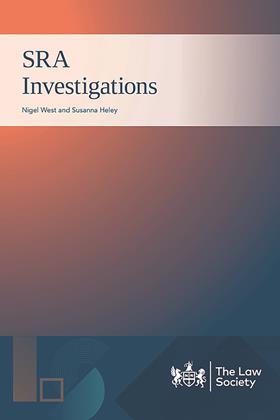SRA Investigations (1st edition)
Nigel West and Susanna Heley
£80, Law Society
★★★★✩
Every area of law develops practitioner works which are useful but probably seem slightly odd to those outside the practice area. It is no criticism of the two authors to note that this is one of those texts. As a geek’s guide to compliance geekdom, this is essential reading for those involved in advising on Solicitors Regulation Authority investigations and SRA proceedings which are resolved without the need to bring proceedings before the SDT, either because the SRA decides no action is necessary or sanction can be agreed short of an SDT referral.
However, this is one of those specialist books which no ordinary practitioner would ever want to have to read. My experience is that most practitioners do their best to comply with an increasingly complex and confusing regulatory system.

This book does a very good job of explaining the regime in terms of the statutory powers available to the SRA and how in principle it says it makes decisions. Of course, as practitioners will know, one of the challenges with the SRA is that it is not consistent. There is a degree of subjectivity in almost everything it touches.
The importance of this work to specialist practitioners is that it neatly summarises where to find the rebuttal to some of the more commonly inconsistently applied provisions of SRA powers. It offers a useful collection of case law for challenging any application by the authority.
The chapter on Starting an Investigation is short but useful, and the summary in relation to cooperating with investigations and production notices is succinct. Those facing investigation may find the material a useful introduction, if a little lightweight. Professional advisers, meanwhile, who are seeking to persuade the SRA in relation to potential sanctions, will find much useful information collated for the first time in a professional work. This includes an overview of the distinct regimes for traditional law firms and alternative business structures.
The key audience for this book is likely to be regulatory geeks such as myself. But those with personal experience of the regime and facing a confusing environment may find that this work offers a solid overview of a niche area of practice. It is, however, clearly no substitute for independent and experienced advice.
Paul Bennett is a regulatory specialist solicitor and partner with Bennett Briegal LLP































No comments yet